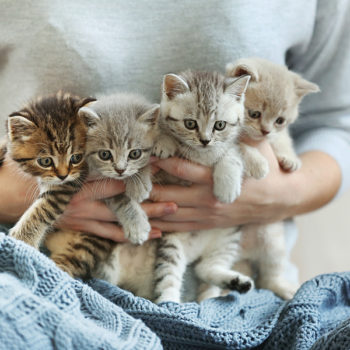Animal shelters dread it: the death of a single kitten in a litter from feline infectious peritonitis (FIP). How much risk are the littermates at of becoming ill? Should they be kept in isolation from other cats, and if so, for how long? Should they be adopted out? If so, when? And what do you tell potential adopters?
Few diseases are as baffling and heartbreaking as FIP. Although it’s technically caused by a coronavirus, many cats — even most in a given population — can test positive for the virus and never become ill. But the virus mutates in some cats, for reasons not yet understood, causing FIP. Because FIP is fatal, the question of how to manage the littermates of a kitten who succumbed to the disease becomes critical in animal shelters.
“This is a tough situation with no easy answer,” said Dr. Kate Hurley of the UC Davis Koret Shelter Medicine Program. “We know the other kittens are at higher risk, but there’s no test to tell which, if any, will go on to get ill.”
What we do know, said Hurley, is that “because disease can develop any time within about 18 months after exposure, and maintaining these kittens in the stressful situation of a shelter will only increase risk, ‘quarantine’ is not an option. Additionally, if they happen to be infected with, and shedding, a particularly virulent strain of coronavirus — one more likely to mutate to FIP in an individual cat — keeping them in the shelter is not an optimal plan for the other kittens in the facility.”
Tanya Hilgendorf, president and CEO of the Humane Society of Huron Valley in Ann Arbor, Mich., said recommendations for long periods of isolation typically come from veterinarians outside the shelter.
“When a vet not well trained in shelter medicine is making decisions about animals, the results can be extremely problematic,” she said. “Shelter leaders need to be watchful of overly conservative views on risk management, and too-quickly recommending isolating animals. These recommendations are well-intentioned, but are based on a lack of understanding that shelters are simply way stations, and that extensive holding has very negative effects on the individual animal’s behavioral, emotional and physical health, and on organizational health overall.”
Hurley suggested the best option, if it’s possible, is to sterilize the kittens and then house them in informed foster care without other kittens while looking for homes for the littermates. “FIP can be a heart breaker,” she added, “so I think it’s fair to let adopters know they’re taking on an extra risk and hope that kind hearted folks will still open their homes to these kittens. After all, we never do know how long a cat will live, even when we don’t know of this extra risk.”
Hilgendorf agreed. “We explain that the cats were exposed to a serious disease early in life, which is not uncommon among stray animals. We also tell them they’ve shown no signs of illness and there is little evidence suggesting that they are not going to live long lives and make great companions. While, as with all things in life, there are no guarantees, I say forget the hand-wringers, and get those animals into a home!”
One more thing, said Hurley, is clear: “Keeping these kittens languishing in the shelter is a no-win situation. It will increase the stress the kittens experience, which in turn increases the risk that they will develop FIP. While they likely pose very little risk to adult cats in a pet home, exposing them to the many other stressed kittens that could pass through your shelter, when they may be shedding a relatively virulent coronavirus strain, is far from ideal.”
For more information on FIP in animal shelters, visit the UC Davis Koret Shelter Medicine Program website’s FIP information center.

